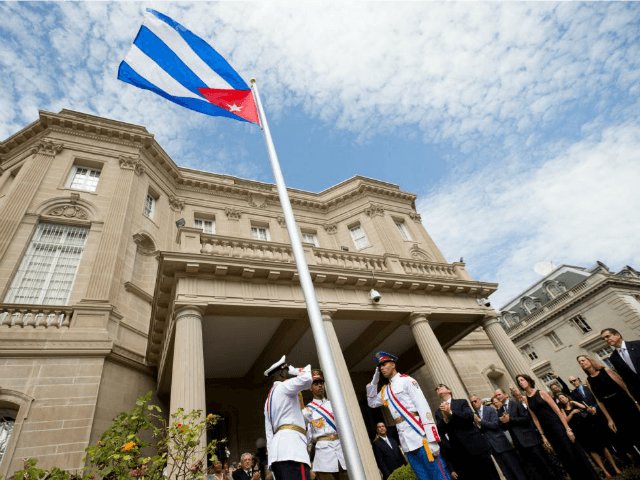An individual who CBS News identified this week as a victim of a series of mysterious attacks on U.S. embassy workers in Cuba told the news outlet that the State Department was “trying to hide” the incidents and “ignored” those who raised concerns.
CBS News says the anonymous individual described in detail hearing “extremely loud grinding insect-like noises” and “a laser-like sound” before suffering health defects while working for the State Department in Havana. He or she adds that they believe attacks occurred both in homes and hotels and inside the embassy itself, which if true is a violation of the 1961 Vienna Convention on the treatment of diplomats. While the State Department has neither identified any of the victims nor described the symptoms in question, the description in the CBS report matches previous similar publications by the Associated Press and others who described the attacks as “acoustic” or “sonic.”
The State Department has confirmed at least 22 victims of these attacks, all U.S. workers. It has also acknowledged private individuals staying in Cuban government-owned hotels have reported similar symptoms to those of the victims, but they have not been able to confirm that the attacks caused these symptoms.
“I know they were trying to hide,” the victim told CBS. “The thing that pisses me off the most is when people tried desperately to protect other people and were ignored … I don’t know how they can justify leaving anyone down there right now, from a safety perspective.”
The individual added that he or she believed that the State Department had “pressured some U.S. embassy officials injured by the attacks to remain on the island,” in CBS News’ words.
The State Department announced this month that it would withdraw all non-essential American staff from the American embassy in Cuba, reopened for the first time since the bloody 1959 revolution under President Barack Obama.
State Department spokeswoman Heather Nauert responded to a question on the CBS News report Tuesday by noting that she had spoken to a different individual—not a victim of the attacks—who praised the State Department’s response to the incident.
“I was just speaking with one of our colleagues who served down there in Cuba and is recently back here in the United States. … This person said to me once we figured out a pattern, yes, the State Department was extremely responsive,” Nauert said. “This person said to me that they—I’ll say ‘they’ so it’s not a he or she—never felt the pressure to stay in Cuba, although they wanted to make it clear that they wanted to serve down there.”
Nauert clarified that the individual she spoke to was not a confirmed victim of the attacks.
Asked if those “essential” staffers remaining at the embassy are safe, Nauert did not provide a yes or no answer.
“I think the Secretary’s been clear about this. We have people who serve in unsafe positions all around the world. You know the countries. But that’s the job that some of these folks in the State Department do,” she responded.
Secretary of State Rex Tillerson announced the withdrawal of most personnel at the embassy in late September “until the Government of Cuba can ensure the safety of our diplomats in Cuba.” While the Trump administration has not accused Cuba of conducting the attacks, and has claimed that communist officials are cooperating with their U.S. counterparts, the State Department has asserted that Cuba does not appear to have the will or the ability to protect American diplomats on the island.
Following that declaration, the State Department imposed limitations on private U.S. citizens visiting the island, now banned from staying at the Hotel Nacional and Hotel Capri, two locations where American officials believe attacks occurred. The Trump administration also demanded 15 Cuban diplomats return to the island from their embassy in Washington, citing the need to balance the staff levels at both embassies.
The communist Castro regime has responded by calling the withdrawal of American staff “hasty” and, later, denying the existence of the incidents in question entirely.
“There does not exist evidence of the occurrence of the alleged incidents, or the causes and origin of the health symptoms American diplomats and families notified us of,” Cuban Foreign Minister Rodríguez told reporters last week, calling the accusations “science fiction” in an extensive press briefing, quoted in full by communist propaganda outlet Granma, which referred to the attacks on U.S. diplomats in scare quotes.
The United States claims to not have any evidence that Cuban officials were involved in or have the capacity to engage in the attacks in question. Evidence exists, however, that the Castro regime has used acoustic torture to hurt political prisoners. A former Cuban prisoner of conscience, Luis Zúñiga, testified before the U.S. embassy attacks became public this year that he had experienced a form of acoustic torture in prison, describing a “sound that was like short-wave radio when it was not set on any particular station and would emit shrill sounds.”
Zúniga said he witnessed a prisoner die during this particular torture, either killed by the health effects of the acoustic device or by his own hand, unable to withstand the sound any longer.

COMMENTS
Please let us know if you're having issues with commenting.